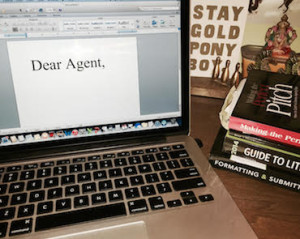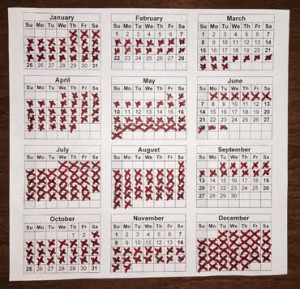 A funny thing happens when you finish your manuscript and you are ready to begin your search for representation. Suddenly you are required to make the giant leap from artist to businessperson—someone who can write a sharp query letter and pitch their work with ease. When I entered this phase of my writing career, I did what I always do when I’m faced with a new writing task, and spent weeks researching on the Internet. There is an endless supply of advice online about the querying process, from agents and authors both. Wanting to give myself the absolute best chance, I was determined to follow it all.
A funny thing happens when you finish your manuscript and you are ready to begin your search for representation. Suddenly you are required to make the giant leap from artist to businessperson—someone who can write a sharp query letter and pitch their work with ease. When I entered this phase of my writing career, I did what I always do when I’m faced with a new writing task, and spent weeks researching on the Internet. There is an endless supply of advice online about the querying process, from agents and authors both. Wanting to give myself the absolute best chance, I was determined to follow it all.
I knew the importance of writing a good query letter—one that hooks the agent and gets her to want to read more. But something I had never considered was timing. Could when you query be just as important as the quality of your query letter? Could querying at the right time keep me out of the slush pile? Here are the suggestions that I found.
When not to query:
- The week of a major holiday
- The week before, during, and after a major trade conference like Book Expo America, the London Book Fair, the Frankfurt Book Fair, and The Bologna Children’s Book Fair
- The week before or after a writers’ conference that the agent is attending
- Three or four weeks after the agent has attended a conference (when all of their requested materials start to roll in)
- Summer (because publishing shuts down in the summer)
- The week before a long weekend
- The week after NANO, because agents are flooded with brand-new, unedited NANO manuscripts and they will think yours is one of them
- The entire month of December (because agents are trying to wrap up all of their projects before the year’s end)
- The week after New Year’s, because agents are flooded with queries from writers who have made the resolution that this is the year they will be published
- The week before an agent’s vacation. (no suggestions were offered on how to procure this information, but still–DON’T DO IT)
- When you know the agent is out of the office (see above)
- When they are closed to submissions
This is what it looks like if you follow ALL of the above advice:

That leaves you only sixteen out of fifty-two weeks a year to send out your queries. If every one of the thousands of writers sending out queries every year followed these guidelines, I bet those sixteen weeks would be weeks all agents would dread. I do think it’s smart not to query during the week of a major holiday, but even then, the worst thing that is going to happen is that you are just going to wait a bit longer. An agent that is going to delete your query solely because you sent it to them in July isn’t an agent you want to have.
So let’s talk about when TO query.
Query when you are ready. That’s it!
This is what I mean by ready:
- Your manuscript is 100% polished, you have had your query letter critiqued and proofread by more then one trusted reader, and you are ready at any moment to respond to an agent’s interest. My experience with publishing is that things can take a very long time—or they can happen VERY QUICKLY. Don’t pull the trigger until you are ready to send out your work at a moment’s notice.
- You’ve done your research and made the best agents-to-query list possible. Be thoughtful about who you query. I am the world’s most impatient person, and when I was ready, I was ready. But I spent several months researching each agent on my list. Before I hit send, I could tell you what clients the agent represents, a selection of editors and houses that they had sold to, what genres they were currently selling in, whether they were on Twitter or not, if they kept a blog, and how they usually handled responses to queries (are they a no-response-means-no-kind of agent or do they answer all of their queries?) Research is important because it is a waste of time for both you and the agent if you query someone who doesn’t represent your type of work, or if they just signed a client whose work is too much like yours. And you want to be able to make a connection with the agent in that first line of your letter, and that takes research. I truly believe that taking the time to research will actually shorten your search.
- You’ve triple-checked that you are following the agent’s submission guidelines. Usually you can find these on the agency website, but some of the large agencies like ICM and William Morris do not make that information available. If this is the case, many agents will list their guidelines on their Twitter page, on a personal blog, in an interview, or on a member page of either Publishers Marketplace or Query Tracker. Guidelines and preferences change, so make sure you are working from the most current information.
Happy, successful querying! May you find an agent who is the world’s best negotiator and wildly passionate about your work.




4 comments